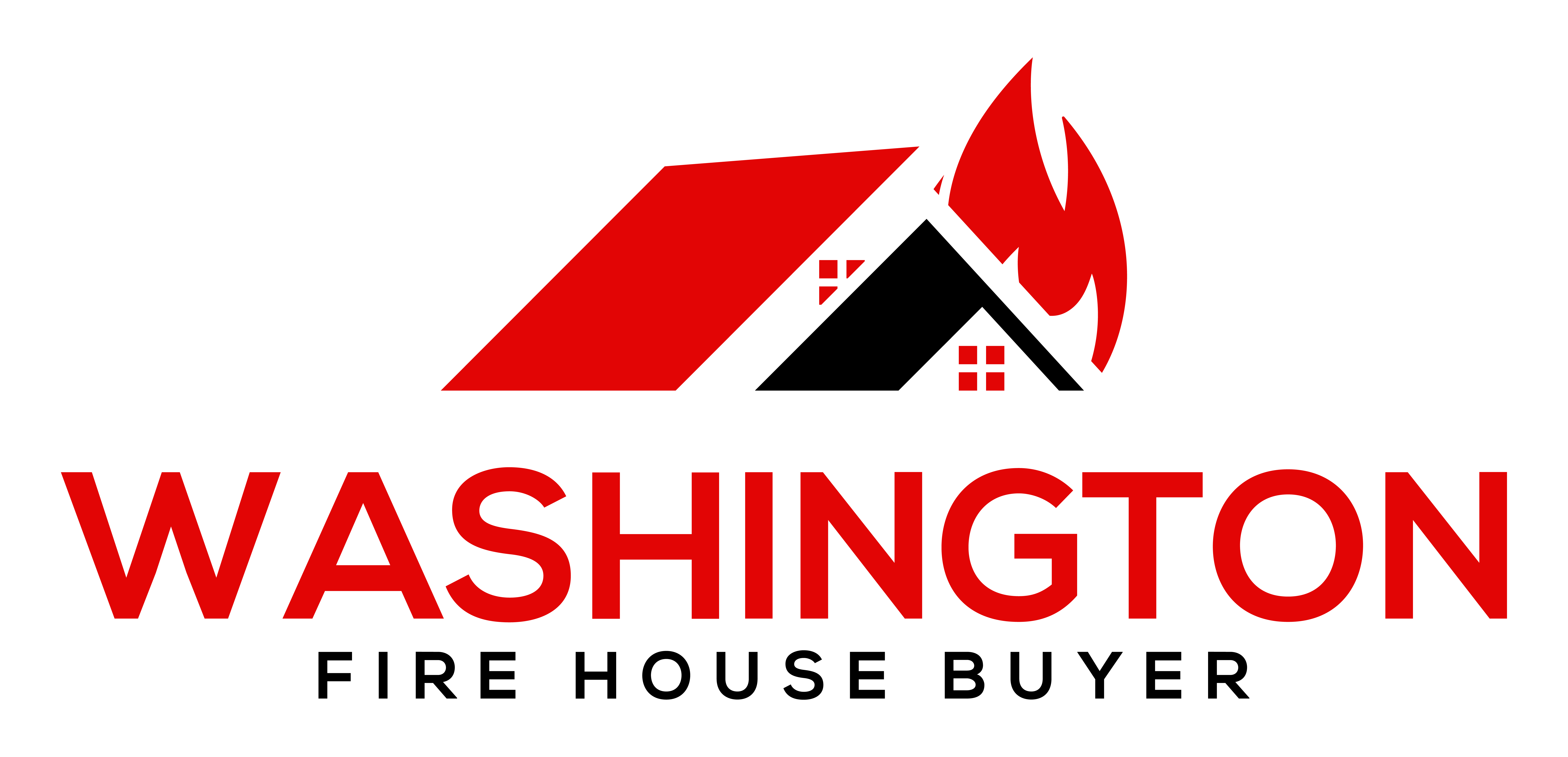Selling A House With Fire-Damaged In Seattle
I buy fire damaged houses in Seattle cash as is, get a fair offer today


We’ll Give You A No Pressure As-Is Cash Offer in 24 Hours
We’re Local, Can Close in 10 Days, Fast Cash




How To Sell A Fire Damaged House As Is In Seattle
Looking to sell your Seattle home as-is? Whether you’re in Ballard, Capitol Hill, West Seattle, or Beacon Hill, our simple 3-step process makes it easy. Skip the hassle of a traditional sale—get a free offer and cash in your account in as little as 7 days, or on your schedule. Ready for a faster move? Contact Sell Fire Damaged House Seattle today!



Fill Out Form
Fill out our form and we’ll get started on your free offer! No obligations.



Receive Cash Offer
We’ll research your property and call you with our fair offer in cash!


You Get Paid!
Money in your bank account at closing. As quick as 7 days!
Sell Your House Fast After a Fire
Sell your fire-damaged house in Seattle—fast and hassle-free. From Queen Anne to Rainier Valley, our streamlined process lets you move forward quickly and focus on what matters most.
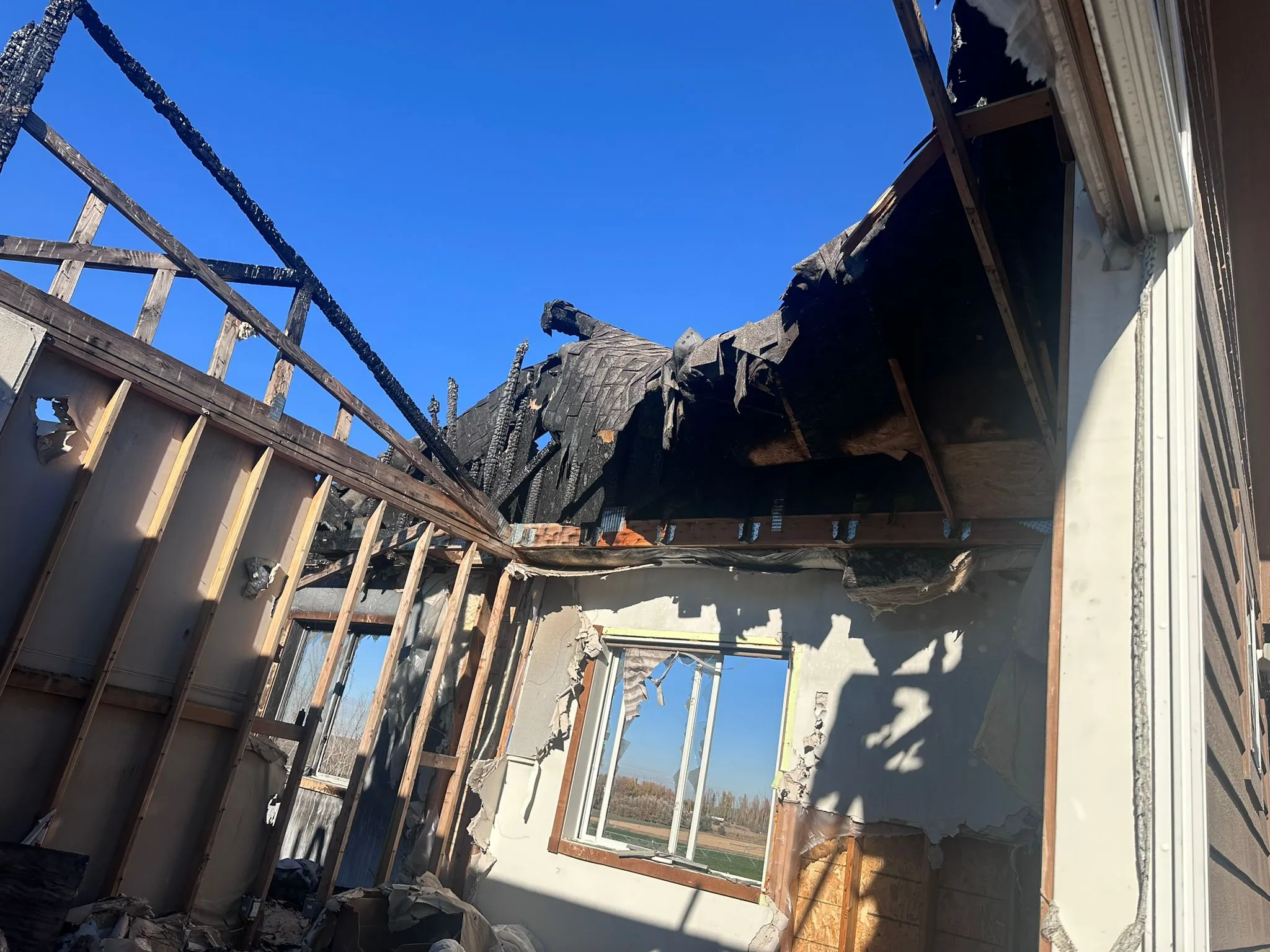
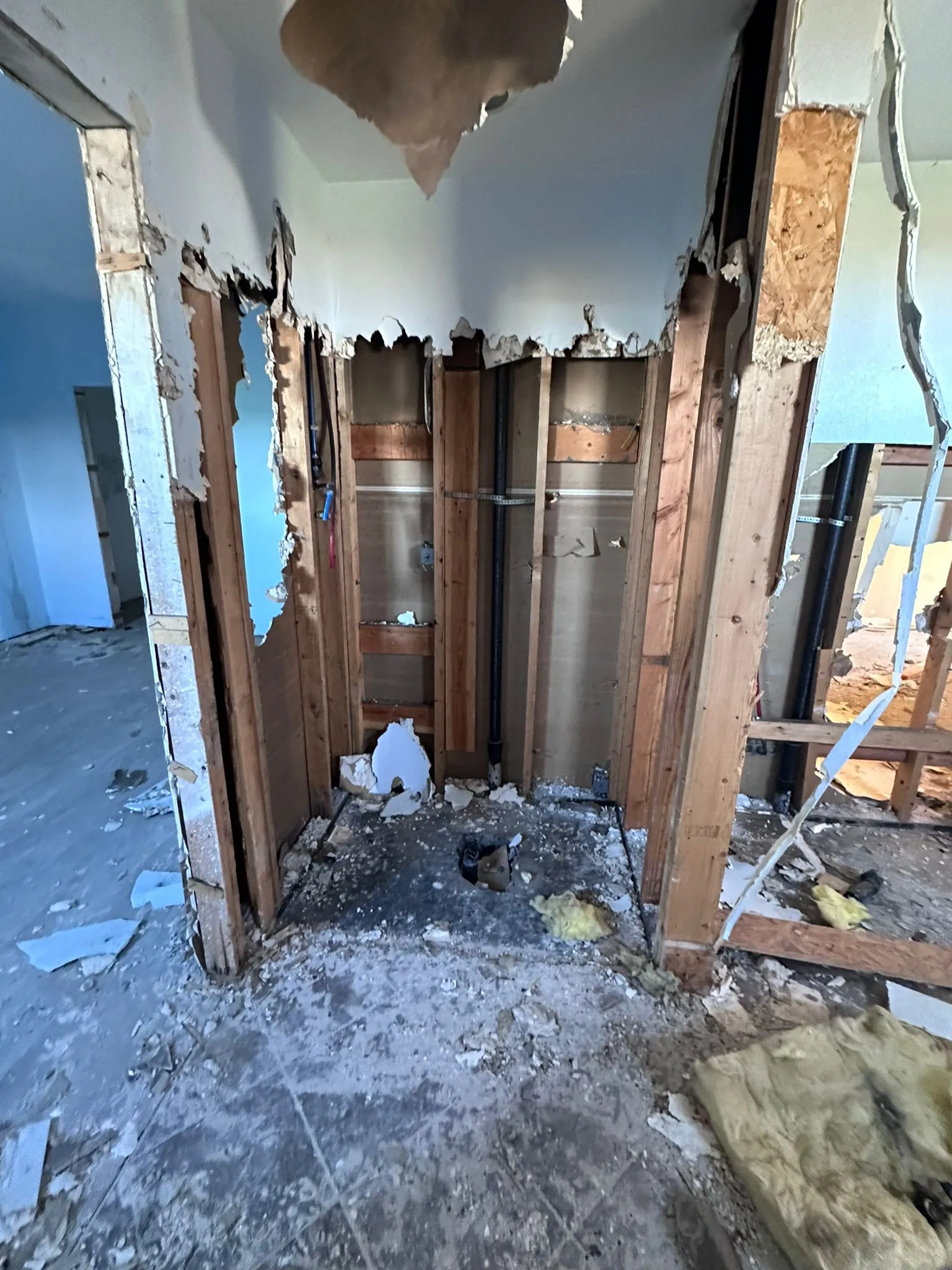
How To Sell A Burned Down Fire Damaged House In WA
- We Buy Fire Damaged Homes
- Selling a fire-damaged house in Seattle requires weighing the pros and cons of various options, such as selling as-is or repair and listing.
- It is important to consult a fire damage restoration contractor to properly assess the damage and estimate repair costs in order to accurately price a house with fire damage.
- In Seattle, it is recommended to disclose fire damage when selling your property in order avoid potential legal disputes & financial liabilities.
We Buy Fire Damaged Homes As Is
We buy Seattle homes as-is—whether you’re in Greenwood, South Lake Union, or Columbia City. Skip MLS listings, showings, inspections, and realtor fees. No matter your situation—financial stress, probate, or just wanting a simple sale—we make the process easy and hassle-free for you.
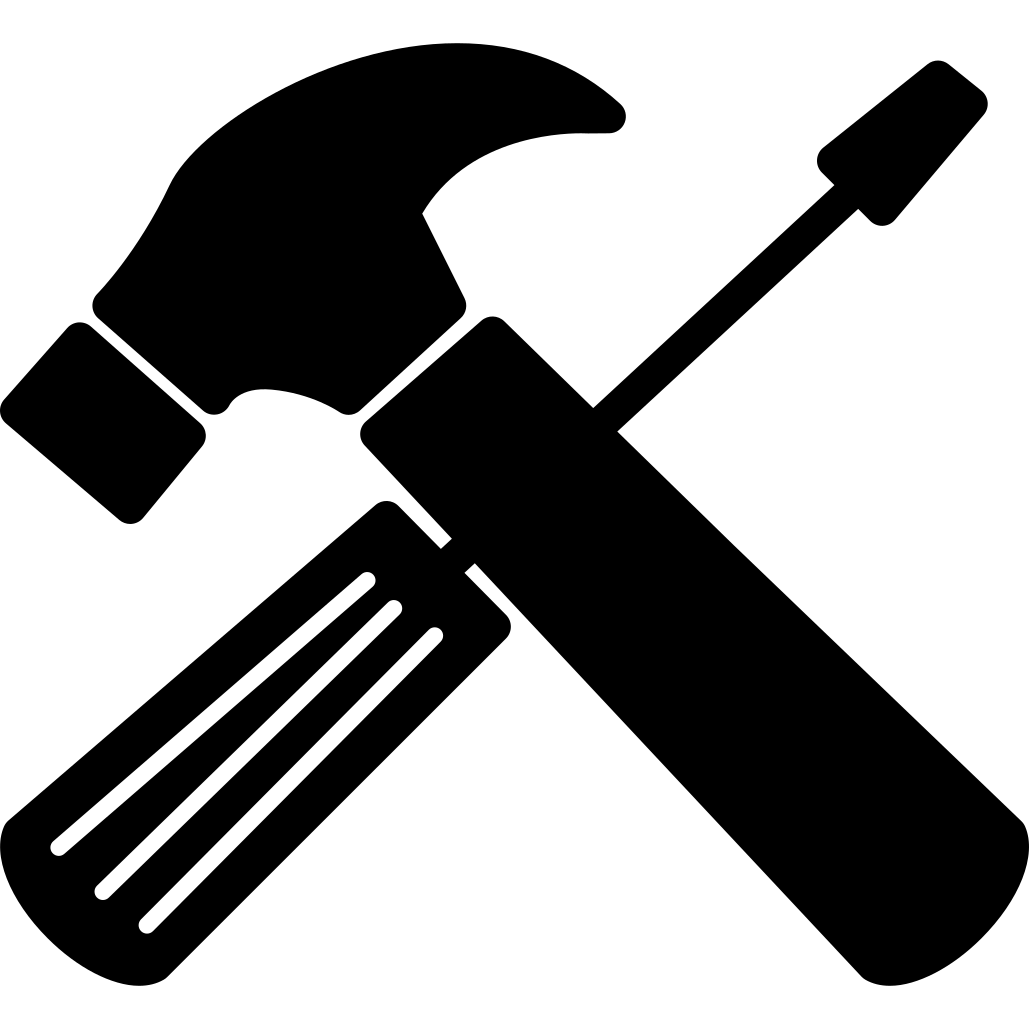
No Home Repairs
Selling your house as is means we take care of all the hassles!

No Agents
Skip paying for agent commission. We make home sales simple!

No Fees
Not only do we have NO agent or iBuyer fees, we cover closing costs!

Fast Closing
Sell your home in 7 days or on your timeline! We buy homes fast.

No Obligations
Take it or leave it. Our free cash offers come with no obligations.

Hassle Free
No agents. No inspection. No delays. We buy real estate as-is for cash!
Can I Sell A Fire-Damaged House In Seattle?
Although selling a fire-damaged house in Seattle is possible, it comes with its own set of challenges. The market value of the property is likely to be affected by the damage caused by the fire. This means that selling at a desirable price may be difficult. Additionally, potential buyers may be more inquisitive and cautious when considering such properties.
When selling your fire-damaged house in Seattle, you can either restore it or sell it as-is. If you decide to restore the property, you may face high repair costs and a lengthy rebuilding process. On the other hand, selling as-is can save you time and money, but may result in a lower selling price. Regardless of your decision, honesty about the damage and required repairs is critical.
Sell Fire Damaged House Seattle!
If a simple home sale that closes on your schedule sounds like what you need, come check us out. You can request a free quote for your house by filling out our form below!
We’ll Give You A No Pressure As-Is Cash Offer in 24 Hours
We’re Local, Can Close in 10 Days, Fast Cash
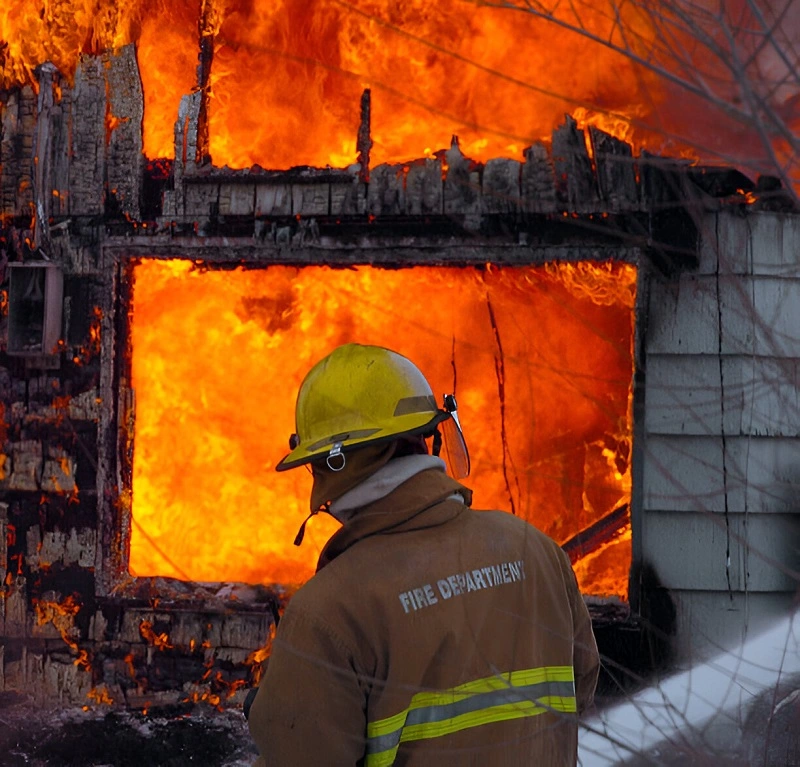
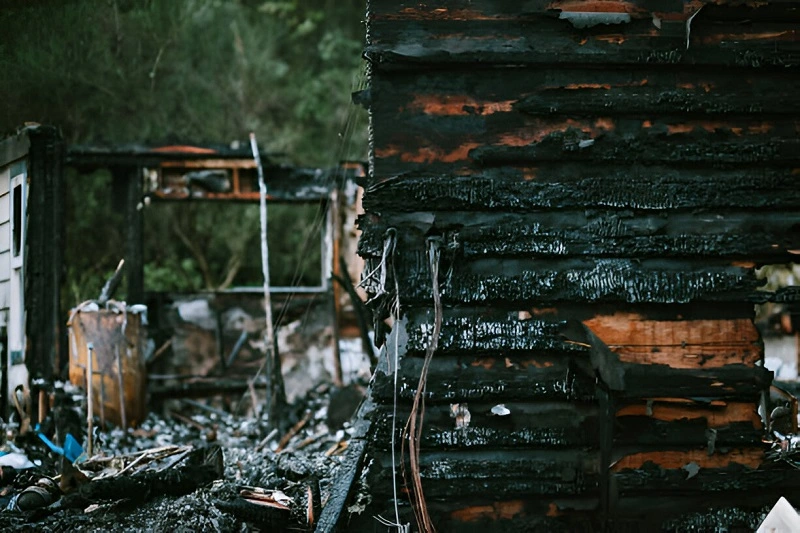
There are 33 fire stations strategically placed throughout Seattle, staffed 24 hours a day, seven days a week. These stations are divided into five battalions, each supervised by a battalion chief. However, it’s worth noting that as of April 2021, the department operated out of 34 stations, but recent information confirms 33 stations are currently in operation.
Fire restoration costs in Seattle, like elsewhere, vary significantly based on several factors including the size of the home, the extent of the damage, and the type of fire. Here are some general estimates:
1. Cost Per Square Foot: Fire damage restoration typically costs between $4 to $7 per square foot nationally, but in Seattle, material costs can range from $11 to $13 per square foot for fire damage repair projects, including water damage restoration.
2. Average Restoration Costs: Nationally, the average cost for fire damage restoration is around $20,470 to $27,175, with a range from $2,900 to $51,243 depending on the extent and type of damage. For smaller fires, costs can be as low as $3,500 to $5,000.
3. Specific Costs in Seattle: While specific Seattle costs are not detailed, the general trend suggests that costs will be influenced by local labor rates and material prices. For instance, water damage repair in King County averages between $2,363 and $2,491.
4. Additional Costs: Additional expenses may include soot and smoke removal ($2,000 to $6,000), water damage restoration ($1,000 to $4,000), and structural repairs, which can vary widely depending on the extent of the damage.
The cost to build a new construction home in Seattle varies widely depending on several factors such as the size of the home, materials used, and design complexity. Here are some general estimates:
1. Cost Per Square Foot: Building a home in Seattle typically costs between $350 to $500 per square foot for a standard home, and can go up to $500 to $750 per square foot for more luxurious or custom designs.
2. Total Construction Costs: The average cost to build a home in Seattle ranges from $241,000 to $580,500, with some projects reaching up to $650,000 or more, depending on the size and complexity of the build.
3. Land Costs: In addition to construction costs, land acquisition can add significant expenses. The average land cost in Seattle is around $80,400 per acre, though this can vary based on location and availability.
4. Permits and Other Costs: Additional expenses include building permits, which typically range from $1,200 to $2,000, and other regulatory costs.
The Seattle real estate market is experiencing a mix of trends as of early 2025. Here are some key insights:
Inventory and Market Balance:
- Inventory Growth: There has been a notable increase in available homes, with a 43.94% jump in listings compared to February 2024, reaching 4,216 properties in King County. However, inventory remains below historical norms, contributing to sustained price stability.
- Market Balance: The market is shifting towards a more balanced state, with buyers having more options and negotiating power due to increased inventory.
Home Prices:
- Price Trends: Home prices in Seattle have stabilized, with slight increases. The median home price was around $846,500 to $851,000 in February 2025, reflecting minimal year-over-year growth.
- Price Appreciation: Analysts predict prices may rise by 3% to 4% annually through 2025, though high mortgage rates may limit significant growth.
Mortgage Rates and Affordability:
- Mortgage Rates: Rates are expected to remain in the 6.5% to 7% range, impacting affordability and buyer activity.
- Affordability Challenges: High mortgage rates continue to pose challenges for buyers, though reduced competition may offer negotiation opportunities.
Sales Activity and Demand:
- Sales Activity: Closed sales in Seattle were almost flat, with a slight increase in pending sales, indicating sustained demand.
- Days on Market: Homes are selling quickly, with an average of 9 days on the market, highlighting strong buyer demand.
Seattle is renowned for its vibrant attractions that cater to a wide range of interests. Here are some of the most well-known city attractions:
Space Needle
- Location: Seattle Center
- Features: This iconic 605-foot-tall spire offers panoramic views of the city from its observation deck and features a rotating restaurant.
Pike Place Market
- Location: Downtown Seattle
- Features: Known for its lively fishmongers, fresh produce, and local crafts. It’s a historic marketplace that showcases Seattle’s culinary excellence.
Seattle Waterfront
- Location: Along Puget Sound
- Features: Offers stunning views of Elliott Bay, shopping, dining, and attractions like the Seattle Great Wheel4.
Chihuly Garden and Glass
- Location: Near the Space Needle
- Features: Features stunning glass sculptures by Dale Chihuly in a beautiful garden setting.
Kerry Park
- Location: Queen Anne neighborhood
- Features: Known for its panoramic views of the city skyline, especially during sunset.
Museum of Pop Culture (MoPOP)
- Location: Seattle Center
- Features: Celebrates music, science fiction, and pop culture with interactive exhibits.
Seattle Aquarium
- Location: Waterfront
- Features: Offers a glimpse into marine life with interactive exhibits and underwater viewing areas.
Beneath the Streets
- Location: Pioneer Square
- Features: Tours of Seattle’s historic underground passageways.
Olympic Sculpture Park
- Location: Belltown
- Features: A 9-acre park featuring numerous sculptures and beautiful views of Puget Sound.
Seattle Great Wheel
- Location: Waterfront
- Features: A giant Ferris wheel offering stunning views of the city from climate-controlled gondolas4.
Seattle is home to a diverse array of neighborhoods, each with its unique character and attractions. Here are some of the notable neighborhoods in Seattle:
Ballard
- Known for its Scandinavian heritage and vibrant nightlife, Ballard is popular among young professionals and families. It features the Ballard Locks and Golden Gardens Park.
Capitol Hill
- This neighborhood is renowned for its lively nightlife, music venues, and thriving LGBTQ+ community. It’s home to many urban professionals, artists, and students.
Queen Anne
- Offers a mix of urban and suburban living with scenic views, parks, and beaches. It’s a family-friendly area with historic homes and tree-lined streets.
South Lake Union
- A rapidly growing area known for its tech industry presence and modern amenities. It’s highly rated for living due to its proximity to downtown and local amenities.
Westlake
- Located near downtown, Westlake is convenient for those working in the city center. It’s not typically considered a family neighborhood but is great for commuters.
Beacon Hill
- Known for its cultural diversity and panoramic city views. It’s a quieter, residential area with a strong sense of community.
West Seattle
- Offers a more laid-back lifestyle with stunning Puget Sound views. It’s ideal for families and young professionals seeking a slower pace.
Fremont
- Famous for its eclectic vibe, Fremont is home to the Fremont Troll and hosts a lively Sunday Market.
Pioneer Square
- One of Seattle’s oldest neighborhoods, known for its historic architecture, art galleries, and vibrant nightlife.
Columbia City
- Offers a quaint charm with historic buildings, restaurants, and a lively arts scene.
Madrona
- Known for its historic homes and scenic lake views, Madrona is a charming suburban neighborhood with a low crime rate.
Maple Leaf
- A residential neighborhood with a mix of older and newer homes, offering easy access to downtown Seattle.
Sell My Fire-Damaged House in Seattle: What You Need to Know
A house fire can transform your Seattle home from a place of comfort into a source of stress and uncertainty in mere minutes.
The charred remains and lingering smoke damage leave many homeowners feeling stuck between costly repairs and limited options. Yet amid this challenging situation, there’s a clear path forward with multiple solutions for Seattle property owners.
The journey of selling a fire-damaged house in Seattle starts with understanding your immediate priorities and long-term options. From working with local cash buyers who handle damaged properties to managing insurance claims and disclosure requirements, you’ll find practical solutions that align with your specific circumstances.
Seattle’s real estate market includes investors and buyers who regularly purchase fire-damaged properties, often providing a faster alternative to traditional selling methods.
Immediate Steps After A Fire In Your Seattle Home
A house fire can be devastating, but taking swift action after the flames are out can make a significant difference in protecting your property’s value. I’ve helped numerous homeowners handle this challenging situation, and I’ll share the essential steps that have proven most effective.
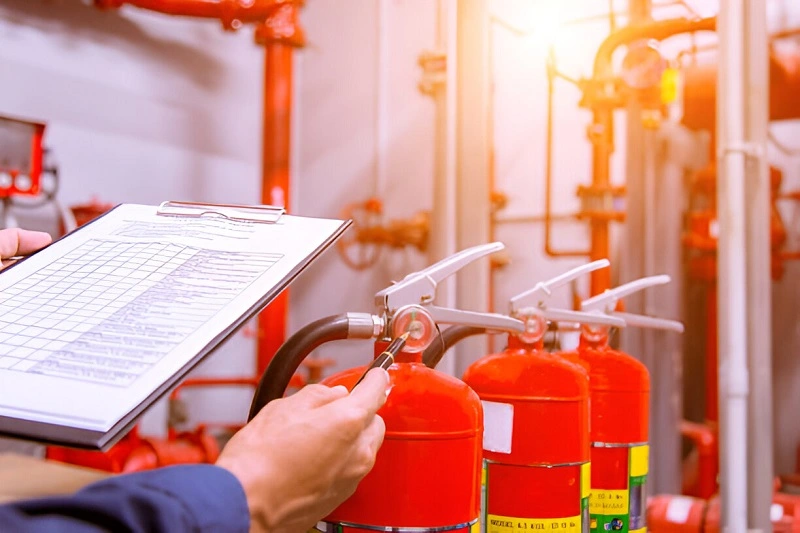
Safety and Documentation Protocols
Your safety comes first – always get official clearance from the fire department before re-entering your property. Once you’re cleared to enter, grab your phone or camera and start documenting everything. I recommend taking detailed photos and videos of all damaged areas, being especially thorough with structural damage and affected personal belongings.
Safety gear is non-negotiable:
• N95 mask or respirator
• Heavy-duty work gloves
• Steel-toed boots or sturdy shoes
• Long sleeves and pants
• Hard hat if structural damage is present
Contacting Your Insurance Provider
Start your insurance claim process right away – every hour counts. Your insurance provider will assign an adjuster, but you’ll want to maintain your own detailed record of events:
• Date and time of the fire
• Names and badge numbers of responding firefighters
• Photos and videos of damage
• Names and contact information of insurance representatives
• Copies of all correspondence
• Timeline of all phone calls and meetings
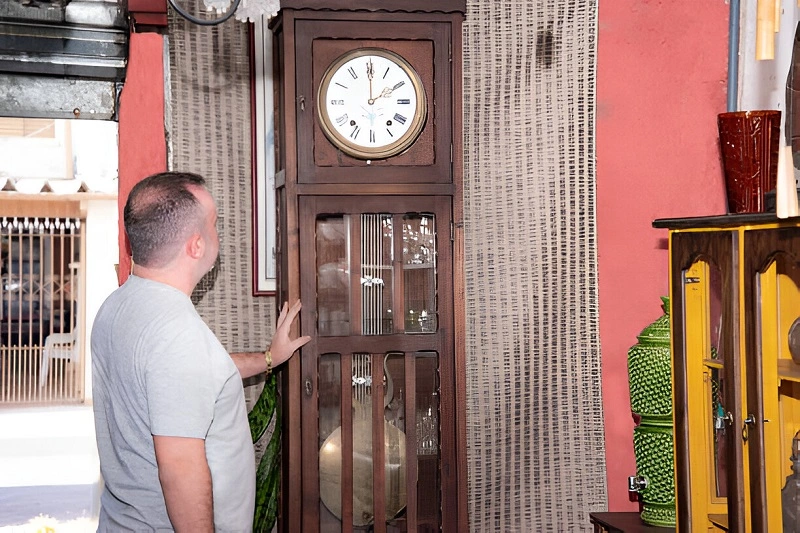
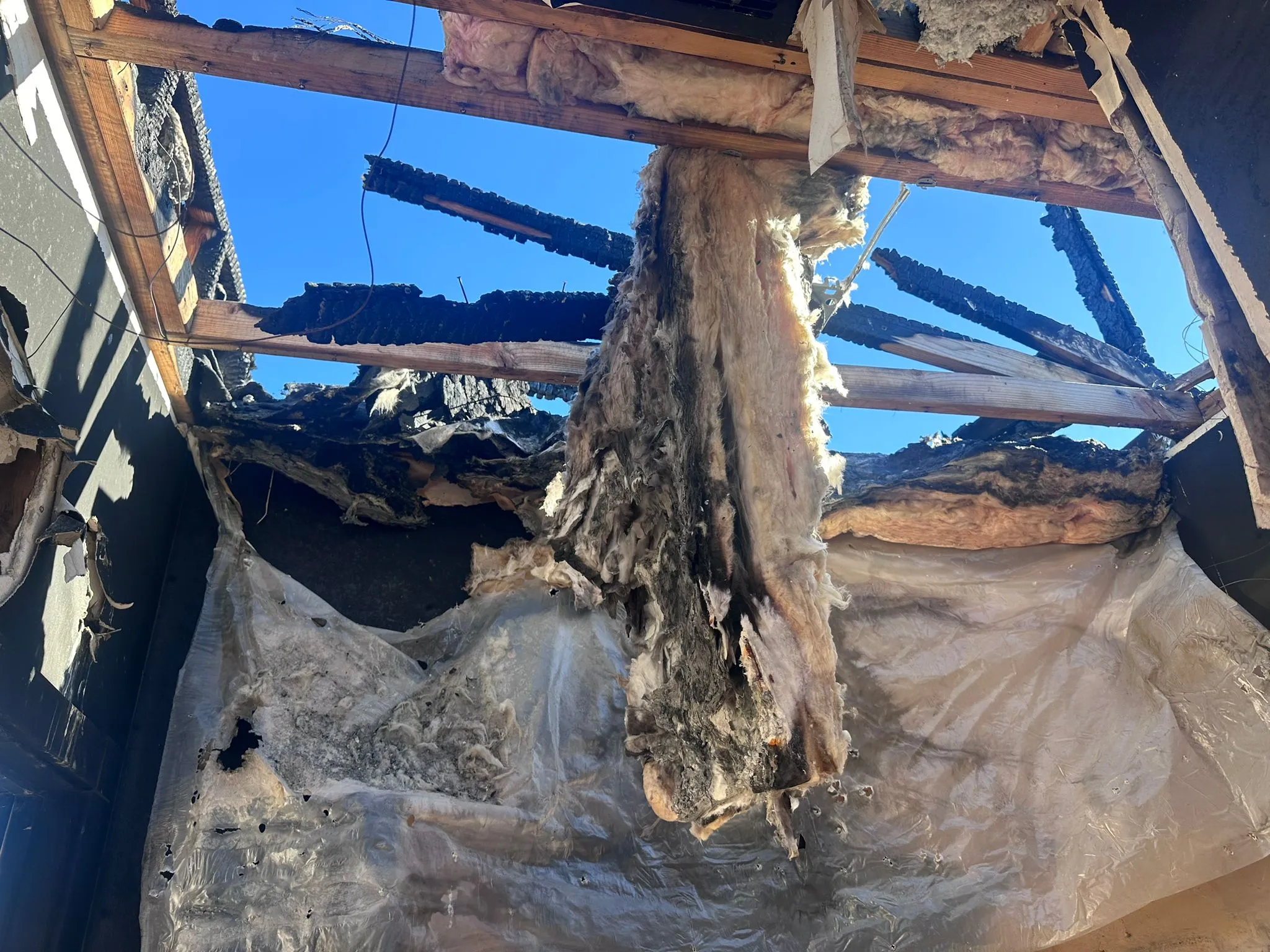
Securing The Property From Further Damage
Think of your fire-damaged home as a vulnerable target that needs immediate protection. From my experience working with restoration experts, these immediate actions can prevent thousands in additional damage:
• Board up broken windows and doors
• Cover roof holes with heavy-duty tarps
• Remove valuable items if safe to do so
• Set up temporary fencing if necessary
• Document all preventive measures taken
Professional Damage Assessment
A professional assessment isn’t just helpful – it’s essential. I’ve seen countless cases where hidden damage would have gone unnoticed without expert evaluation. A qualified structural engineer or fire damage specialist will examine:
• Structural integrity of walls, floors, and foundation
• Extent of smoke and soot penetration
• Water damage from firefighting efforts
• Electrical system safety
• HVAC system contamination
• Hidden moisture that could lead to mold
This detailed evaluation becomes your roadmap for recovery and provides crucial information for potential buyers or investors interested in your property.

The True Impact Of Fire Damage On Your Property
I’ve seen firsthand how fire damage creates ripple effects throughout a property that many homeowners never expect. While those scary burn marks might grab your attention first, there’s actually a whole network of hidden issues that can turn your property into a complex restoration project.
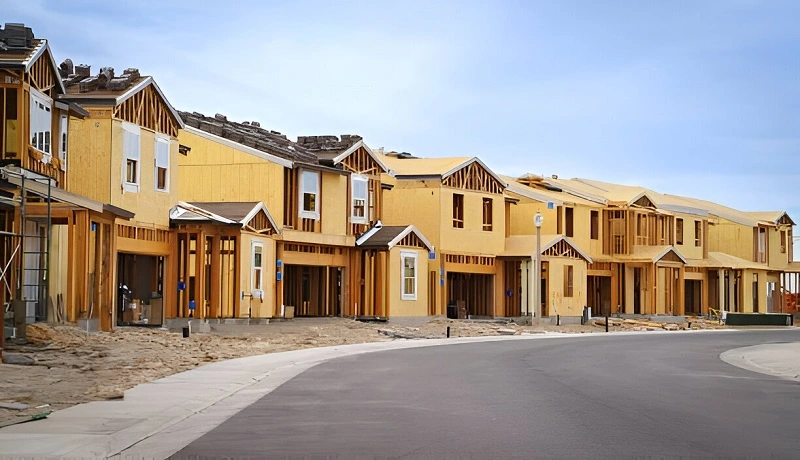
Structural Integrity Issues
Let me tell you something surprising – even a seemingly small fire can significantly impact your home’s structural integrity. I’ve walked through countless properties where the intense heat weakened load-bearing walls and foundation elements without leaving obvious visual clues.
Think of it like this: your home’s wooden framework might look perfectly fine on the outside, but that intense heat could have secretly compromised its strength, creating a ticking time bomb of stability issues.
• Load-bearing wall damage
• Foundation weakening
• Framework deterioration
• Support beam compromise
Hidden Complications Beyond The Flames
Smoke Penetration Effects
Here’s something most people don’t realize – smoke is incredibly sneaky. It doesn’t just leave those obvious dark stains; it actually penetrates thoroughly into your walls, insulation, and wooden structures.
I’ve seen cases where smoke’s acidic nature kept causing damage months after the fire was out. It’s like having an unwanted guest that keeps making trouble long after they should have left.
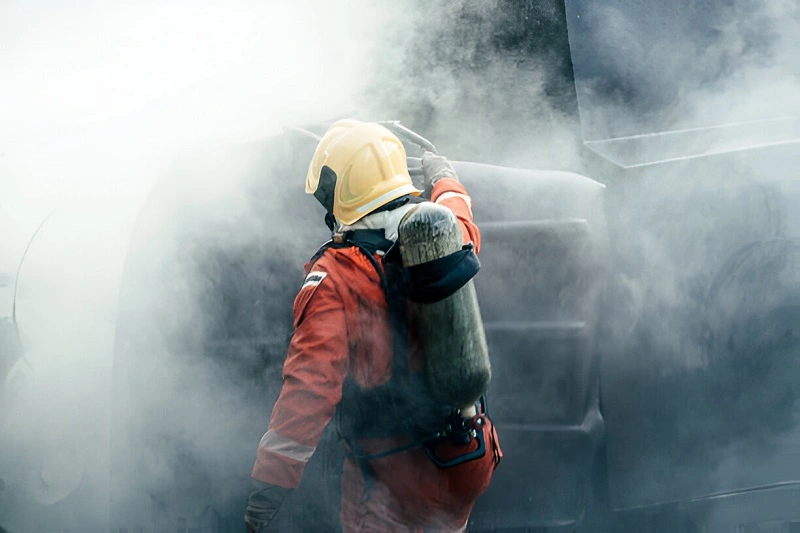
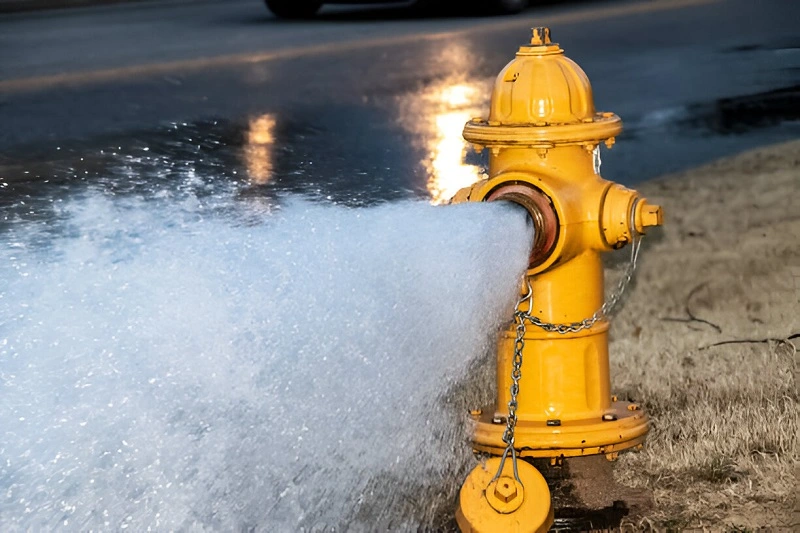
Water Damage From Firefighting
You know what’s ironic? The very thing that saves your house from fire – water – often becomes your next big headache. From my experience dealing with fire-damaged properties:
• Water seepage into walls
• Saturated flooring materials
• Dampness in crawl spaces
• Hidden pockets of moisture
All these create perfect conditions for mold growth and structural rot, sometimes showing up weeks after everyone thinks the crisis is over.
Electrical System Concerns
Let’s talk about one of the most overlooked aspects of fire damage – your electrical system. Even if flames never touched certain areas, the intense heat can melt wire insulation and damage junction boxes throughout your home. I’ve seen cases where:
• Wiring insulation melted
• Junction boxes warped
• Circuit breakers compromised
• Outlet systems damaged
Each of these issues requires professional attention to ensure your home meets safety codes.
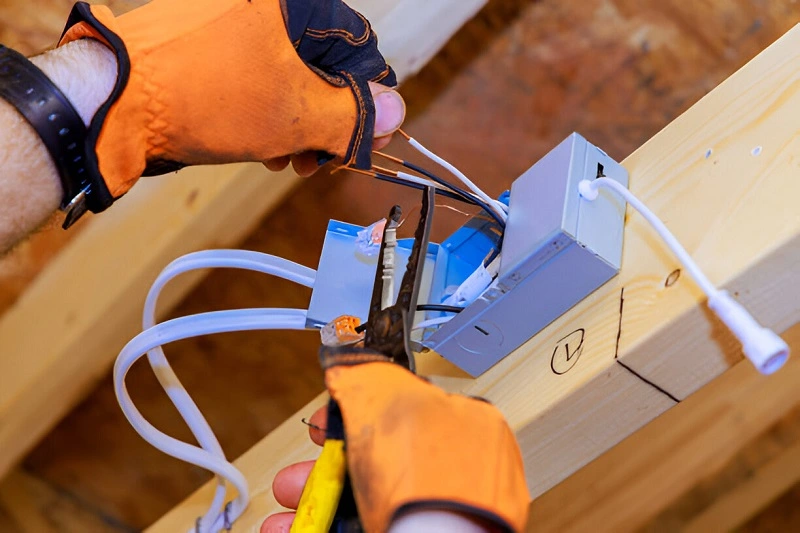

Impact On Property Value
I’ve watched property values take significant hits after fire damage, typically dropping anywhere from 20% to 60%. It’s not just about repair costs – there’s an undeniable stigma attached to fire-damaged properties that makes traditional buyers nervous.
But here’s the silver lining: Seattle has a robust network of investors and cash buyers who specifically look for fire-damaged properties. These specialists often provide straightforward solutions when you’re facing extensive damage and uncertain repair costs.
• Minor damage: 20-30% value reduction
• Moderate damage: 30-45% value reduction
• Severe damage: 45-60% value reduction
Your Selling Options in Seattle
Dealing with a fire-damaged house in Seattle can feel overwhelming, but I’ve helped numerous homeowners explore their selling strategies. Let me walk you through the most viable paths forward, each offering unique advantages based on your specific situation and timeline.
Cash Buyers And Investors
Benefits Of Working With Cash Buyers
• Quick closing timeline (typically 7-14 days)
• No repair costs or renovation expenses
• Zero realtor commissions or hidden fees
• “As-is” purchase guarantee
• Simplified paperwork process
• No financing contingencies
• Buyer covers closing costs
Having worked with many fire-damaged property owners, I’ve seen firsthand how cash buyers can transform a stressful situation into a straightforward solution. These investors specialize in taking on challenging properties and handle all the complicated restoration work themselves.


How To Find Reputable Investors
Finding trustworthy cash buyers doesn’t have to be complicated. Here’s my proven approach:
• Research local investment companies specializing in fire damage
• Verify business licenses and certifications
• Read customer reviews and testimonials
• Request references from recent sellers
• Check Better Business Bureau ratings
• Verify proof of funds before proceeding
• Compare multiple investor offers
Traditional Real Estate Market
The conventional real estate market remains viable, especially for properties with minimal damage. From my experience, this route works best when you’ve already completed some repairs or have insurance funding for restoration. However, be prepared for:
• Longer selling timelines
• Substantial repair investments
• Possible financing challenges for buyers
• Multiple property showings
• Traditional real estate commissions
• Home inspection requirements
• Potential price negotiations


Property Auction Approach
Auctions can create exciting opportunities, particularly when multiple investors compete for renovation projects. Based on recent Seattle market trends, here’s what you should know:
• Fast-paced sales process
• Competitive bidding environment
• No repair requirements
• Predetermined auction date
• Non-contingent sales
• Buyer pool of experienced investors
• Variable commission structures
Price Considerations For Each Option
Let’s break down the typical returns you might expect:
Cash Buyers:
• 50-70% of after-repair value
• No repair costs or commissions
• Immediate cash payment
• Guaranteed closing
Traditional Market:
• 80-90% of market value
• Minus repair investments
• Fewer realtor commissions (5-6%)
• Extended holding costs
Auction Results:
• Variable pricing based on demand
• 10-15% auction house fees
• Competitive bidding potential
• No repair investments needed
Remember, each option’s true value depends on your property’s specific condition, location, and current market landscape. I’ve seen sellers achieve fantastic results through all three methods – it’s about matching the right approach to your unique circumstances.

Legal Requirements And Disclosures
Exploring the legal aspects of selling a fire-damaged house in Seattle can feel overwhelming, but I’ve helped many homeowners through this process. Let me break down the essential requirements you’ll need to handle for a successful and legally compliant sale.
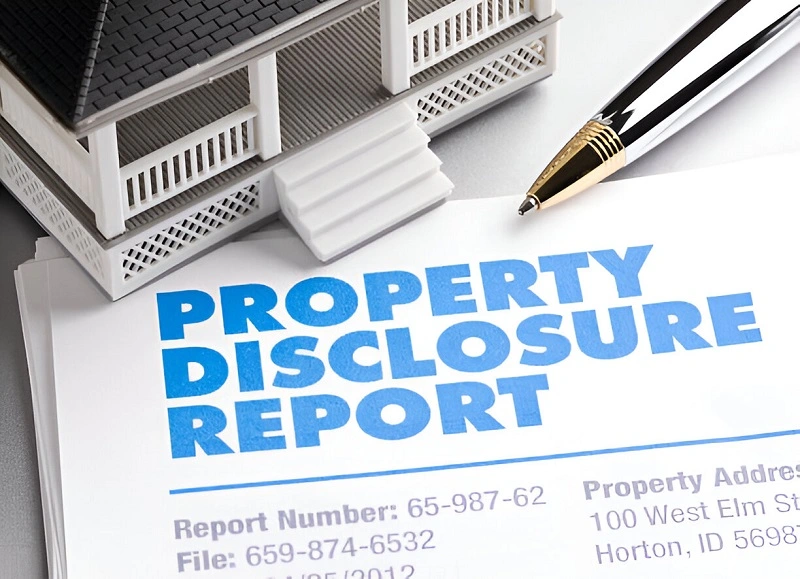
Seattle State Disclosure Laws
Here in Seattle, transparency isn’t just good practice – it’s the law. You’ll need to complete Form 17, the seller disclosure statement, with detailed information about any fire damage. I’ve seen many sellers hesitate about revealing everything, but trust me, full disclosure protects you in the long run.
Even when dealing with cash buyers or “as-is” purchases, you must document the fire damage history. Being upfront builds buyer confidence and shields you from potential legal headaches down the road.
Insurance Claim Documentation
Think of your insurance paperwork as your property’s paper trail – it tells the story of what happened and how it was addressed. Keep these essential documents organized:
• Your initial fire damage assessment report
• All insurance claim submissions and responses
• A thorough list of repairs completed using insurance funds
• Records of pending claims or settlements
Having this documentation readily available helps buyers understand exactly what they’re getting into and often speeds up the sale process.


Property History Records
Creating a clear timeline of your property’s fire incident and recovery efforts is crucial. Your property history file should include:
• Fire incident date and cause documentation
• Professional inspection findings
• Before and after damage photographs
• Details of all remediation work
• Contractor estimates and completed work orders
I’ve found that buyers appreciate this level of organization and transparency. It demonstrates your commitment to proper property management and often leads to smoother negotiations.
Building Code Compliance
Fire damage typically necessitates updates to meet current building standards, regardless of your selling intentions. Here’s what you need to know about compliance:
• Current local building codes affecting fire-damaged properties
• Required permits for completed restoration work
• Status of any existing code violations
• Mandatory safety certifications for property transfer
Even if you’re selling the property without repairs, having a clear understanding of code requirements helps set realistic expectations with potential buyers. This information is particularly valuable for investors and contractors who might see your property as an opportunity.
Consider partnering with a local real estate attorney who specializes in fire-damaged property sales. Their expertise can prove invaluable in exploring Seattle’s specific legal requirements while protecting your interests throughout the transaction.
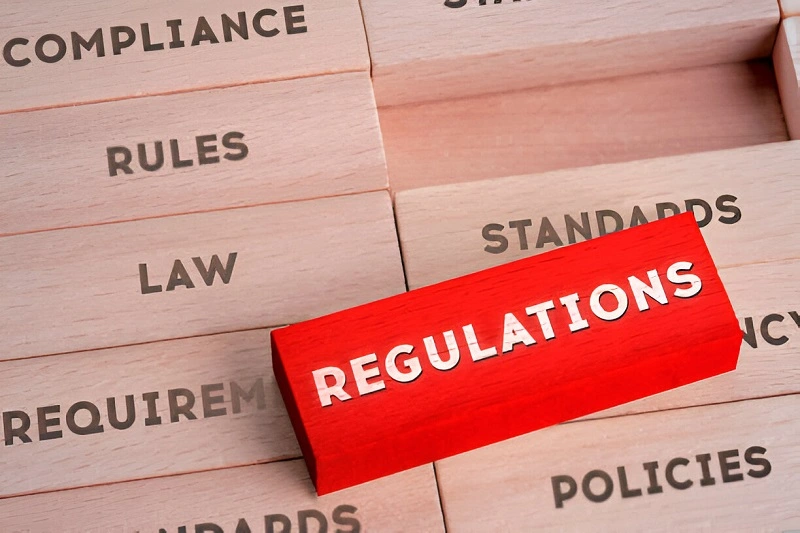
Making The Right Choice: Repair Or Sell As-Is
Deciding whether to repair your fire-damaged house or sell it as-is can feel overwhelming. I’ve helped numerous homeowners work through this challenging decision, and I’ve found that exploring the key factors makes the choice much clearer.

Cost Analysis Of Repairs
Fire restoration costs can range from manageable to astronomical, depending on the damage severity. From my experience working with restoration professionals, even seemingly minor smoke damage can reveal more extensive problems once work begins.
Essential repair costs typically include:
• Initial cleanup and debris removal ($2,000-$10,000)
• Structural repairs and rebuilding ($20,000-$100,000+)
• Smoke and water damage remediation ($5,000-$30,000)
• Electrical system repairs or replacement ($3,000-$15,000)
• HVAC system cleaning or replacement ($2,000-$12,000)
• Cosmetic repairs and finishing work ($5,000-$25,000)
Timeline Comparisons
Time management becomes crucial when dealing with fire damage. Having witnessed numerous restoration projects, I can tell you that full restoration typically takes 6-12 months, while an as-is sale often closes within 2-4 weeks.
Key timeline factors to consider:
• Insurance claim processing time (30-90 days)
• Contractor availability and scheduling
• Permit acquisition and inspections
• Material delivery delays
• Weather-related interruptions


Return On Investment Considerations
The financial equation isn’t always straightforward. While a fully restored house commands a higher price, the investment might not always pay off. I’ve seen cases where selling as-is actually resulted in better financial outcomes.
Essential ROI factors:
• Pre-fire property value
• Current market comparables
• Estimated after-repair value
•Total restoration costs
• Holding costs during repairs
• Insurance coverage limits
• Tax ramifications
Market Conditions Impact
Local real estate factors play a key role in your decision. Seattle’s current market includes numerous investors specifically looking for fire-damaged properties, creating competitive as-is buying opportunities.
Market considerations include:
• Local housing demand
• Available inventory levels
• Investor activity in your area
• Neighborhood development plans
• Seasonal market fluctuations
Cash buyers and investors often provide quick, straightforward solutions. While their offers might be lower than post-restoration values, they eliminate uncertainty and carrying costs. I’ve seen many homeowners find relief in these simplified transactions, especially when facing the emotional and financial strain of fire damage.

Frequently Asked Questions
I’ve seen fire-damaged houses in Seattle sell as quickly as 3-5 days when working with cash buyers or real estate investors. These buyers specialize in damaged properties and can close without traditional financing hurdles.
They’ll often do a quick inspection and make an immediate offer. If you prefer the conventional real estate market, expect a longer timeline of 3-6 months, as buyers may need specialized financing and multiple inspections for fire-damaged properties.
You’ll need several essential documents to sell your fire-damaged property in Seattle:
• Detailed fire damage report from the fire department
• Insurance claim documentation and correspondence
• Professional repair estimates
• Proof of property ownership
• Full disclosure documents (required by Seattle state law)
• Documentation of completed repairs or remediation
• Current building inspection reports
• Structural assessment certificates
Most insurance companies permit property sales before claim settlement, but you’ll need to be proactive about communication. I always recommend getting everything in writing from your insurer. Remember, insurance claims typically stay with you, not the property. Here’s what you should do:
• Notify your insurance company about your intent to sell
• Request written confirmation about transferring benefits
• Document all claim-related communications
• Consider having a legal professional review your insurance paperwork
The fairest pricing approach I’ve found combines several factors:
• Pre-damage property value
• Current market conditions
• The extent of fire damage
• Estimated repair costs
• Comparable sales of damaged properties
• Location and lot value
• Structural integrity assessment
Get multiple professional assessments to establish a realistic price range. Cash buyers typically offer 60-70% of the after-repair value, but they eliminate repair headaches and provide quick closings.
What You Should Do After A House Fire In Seattle
In the aftermath of a house fire in Seattle, immediate actions are crucial to address the situation. Here are the steps you should take:
Quick Checklist
1. Contact the fire department for a report.
2. Speak with your insurance company to assess any damage.
3. File an insurance claim.
4. Adhere to legal disclosure requirements when selling a fire-damaged house in Seattle.
Depending on your decision to repair or sell the fire-damaged house, you will need to:
1. Assess the damage
2. Contact insurance
3. Obtain multiple quotes
4. Budget for unexpected expenses
5. Work with insurance to get your payout
6. Complete repairs
7. List on the market
Collaborating with an adjuster can assist in evaluating damage and repairs and guarantee an equitable settlement when submitting a fire insurance claim.
Sell Your House After A Fire For Cash in Seattle Today
I’ve helped many Seattle homeowners move through the challenging process of selling fire-damaged properties, and I can tell you it doesn’t have to be overwhelming. Let me walk you through your main options:
1. Repair and sell through traditional channels
2. Work with cash buyers who purchase properties as-is
The key to success lies in three crucial factors:
• Your property’s current condition
• Your preferred timeline
• Your financial situation
Here’s what I’ve learned from experience: each selling path comes with distinct trade-offs. Going the traditional route after repairs might bring a higher sale price, but it requires significant time and investment. On the flip hand, cash buyers offer speed and convenience – they’ll take your property as-is, though typically at a lower price point.
Your decision should factor in:
• Insurance settlement details
• Current market conditions
• Personal priorities and timeline
• Available resources for repairs
I always advise my clients to start by gathering essential documentation and understanding their legal obligations as sellers. You might want to consult with:
• Insurance adjusters
• Real estate professionals
• Contractors for repair estimates
• Legal advisors familiar with fire-damaged properties
The Seattle real estate market offers viable solutions for every situation. Whether you’re leaning toward a quick cash sale or considering full restoration, there’s a path forward. Take time to evaluate your options, but remember – the most important step is making an informed decision that aligns with your specific circumstances and property goals.
Sell Fire Damaged House Seattle!
If a simple home sale that closes on your schedule sounds like what you need, come check us out. You can request a free quote for your house by filling out our form below!
We’ll Give You A No Pressure As-Is Cash Offer in 24 Hours
We’re Local, Can Close in 10 Days, Fast Cash
